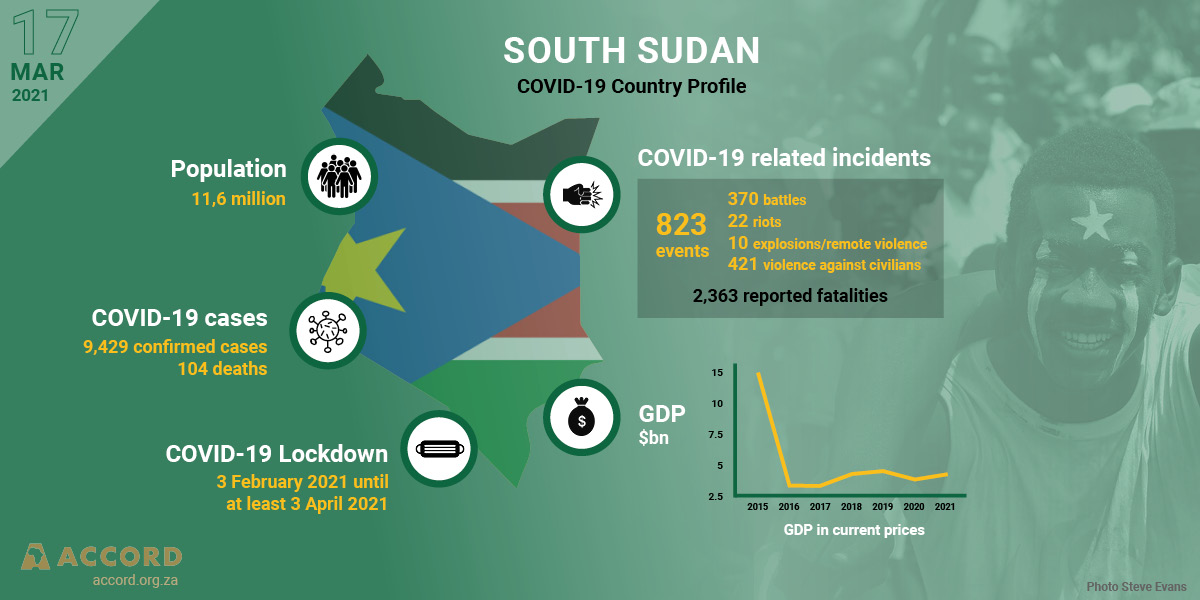As a result of the surge in COVID-19 cases, the South Sudanese government introduced new measures aimed at preventing further transmission of the virus. These measures were first introduced on the 3 February 2021, for one month lasting until the 3 March, but have since been extended to 3 April 2021. Some of the measures introduced include the closure of schools (except for exams), reducing the number of staff working in offices, either by introducing staff rotations or placing staff on paid leave, the closure of bars and nightclubs, limited occupants on public transport and prohibiting social gatherings. While restaurants and cafés are allowed to open, they must comply with the hygiene and social distancing measures that have been instituted.
#SouthSudan’s second #COVID-19 wave has not spared @unmissmedia, which has also been affected.
Tweet
In addition, people must wear facemasks when they are in public and face penalties for non-compliance. In terms of international travel, flights into and out of South Sudan are permitted however, incoming travellers must present a negative COVID-19 test conducted within 96 hours before arrival. South Sudan’s land borders are also open, however, due to restrictions in neighbouring states, traffic at the borders is low. While the restrictions may be in place, public compliance with them is often low, which only serves to undermine the effectiveness of the measures put in place by the government.
South Sudan’s second COVID-19 wave has not spared the United Nations Mission in South Sudan (UNMISS). UNMISS has also seen a rise in COVID-19 cases and has likewise had to enforce new measures to prevent the spread of the virus. UNMISS’ measures included the prohibiting of social gatherings, the wearing of facemasks at all times and restricting the number of visitors allowed onto the bases. UNMISS has had to react to the pandemic by introducing quarantine periods for incoming staff, increasing the testing capacity and restricting the movement of personnel. Other arrangements have also been put in place pertaining to staff leave and suspending staff rotations, postponing some activities and refocusing on others while also having to migrate to online activities that would have otherwise been carried out in person.
It is important for UNMISS to prevent the spread of COVID-19 as it is required to continue its mandate despite the rise in COVID-19 cases in South Sudan. As such, UNMISS needs to protect its own personnel as well as ensure that COVID-19 is not transmitted to vulnerable communities while also supporting the government in their responses. Support to the government includes the donation of personal protective equipment (PPE), disseminating information and raising awareness of COVID-19 and contributing provisions for remote learning.
It will be a long time before #SouthSudan, and many other #African countries, will be able to acquire enough #vaccines to sufficiently vaccinate their population, suggesting that the current second wave in South Sudan will not be the last.
Tweet
According to UNMISS, COVID-19, and the subsequent restrictive measures put in place, have not prevented them from carrying out their critical mandate tasks. However, non-critical activities and support operations have been affected, with some activities either being postponed, delayed or carried out differently. UNMISS has also had to dedicate a number of resources to mitigating the effects of COVID-19. These include prevention measures such as supply route maintenance and quarantining all incoming personnel, which comes at a cost to the mission.
In terms of COVID-19 vaccines, UNMISS personnel are expected to receive the vaccine shortly, after a number of doses were donated by India. As a result, UNMISS are preparing for the rollout of the vaccine to its personnel, with the health workers and those on the front line in the local communities being at the top of the list. Added to this, South Sudan is expected to receive, and start the rollout to its population, of just over 800,000 AstraZeneca vaccines, which South Sudan received through COVAX. However, it is likely that it will be a long time before South Sudan, and many other African countries, will be able to acquire enough vaccines to sufficiently vaccinate their population, suggesting that the current second wave in South Sudan will not be the last.
Katharine Bebington is a research intern at ACCORD. All the information contained in this article has been provided by UNMISS and the COVID-19 data has been verified against WHO and African CDC data.


